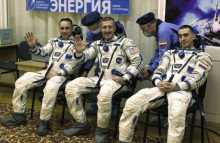The documents outline an 18-year long detailed program of innovations and missions to rehaul the Russian space program. This includes building an entirely new type of spacecraft, already reportedly in the works, and numerous missions all over the solar system. Most eye-catching is the plan, within a decade, to place a “permanent network” of Russian research stations on the Martian surface. These will most likely be automated stations, perhaps using something akin to the U.S. Mars Rovers program. Finally, Roscosmos also plans a “circumlunar manned test flight”, in which cosmonauts will fly all the way around the moon and then land on it. There are a number of reasons this is difficult, not the least of which is the breakdown of communication on “the dark side”, and would eb quite a feat for any space program.
All of these ambitious plans are an effort to “solidify its position” among the top space powers in the word, a position that it’s in a good place to pursue given the U.S. new reliance on Russia for manned space missions with the closing of its own manned space program at NASA. Russia has also had some fairly high-profile failures with deep space and manned space flight missions, most recently becoming the embarrassed owners of a completely useless multi-million dollar satellite that crashed back down to earth. However, with some ambitious (and more importantly, successful) space missions under its belt in the next twenty years or so, Russia could indeed garner a reputation for itself as at the forefront of space exploration.
These ambitious plans are also reflective of Premier Vladimir Putin’s statement that Russia doesn’t want to be the “international ferryman” forever, in reference to Russia’s role in bringing astronauts to the International Space Station. NASA, which is waiting as private companies develop the space tech and expertise necessary for more ambitious space exploration, has not determined its own immediate plans for the future other than continuing the Mars Rover and Orbiter programs, and continuing to monitor deep space satellites.
